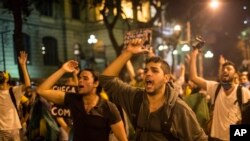BRASILIA —
Brazil's football team plays its final first-round World Cup match Monday in Brasilia. The local popular committee against the World Cup plans a march in the capital, one year after huge national demonstrations against the sporting event and its costs.
Not far away from the University of Brasilia, about 30 people are gathering to celebrate an anniversary. A year ago, hundreds of thousands of Brazilian protesters were in the streets, an outpouring that still divides the country about the billions of dollars spent to organize and host the World Cup.
Thiago Avila is very active in the popular committee against the World Cup. A few years ago, he was a successful businessman. He quit everything to defend his ideas. With the French motto "Liberty, Equality, Fraternity" tattooed on his arm, he hopes Brazil will change.
"We are not against soccer. We love soccer. We believe that they are using a sport that is part of our culture against the people. The population understands that very well. We are against the violations, the corporate rights. We are against all those things that create a model of society which is very different from what we believe in," said Avila.
Avila and the others plan to march on Monday. One more time, they will ask for more investments in public sectors like health or education.
"Our education does not have a good quality," complained Vanessa Dourado, a teacher, who is protesting with the activists. "The public schools, normally, they do not have classes because there are no teachers to teach. If you want good quality education, you have to pay for it."
Another top priority for the protesters: blocking what they say is the insanity in real estate in Brazil. The activists say buildings are growing like mushrooms, without any consideration for the poor or indigenous Indian people who are often expelled from the land.
Sabrina Fernandes, a researcher from Carlton University in Canada, says it’s a systemic problem.
"[Many are upset about] . . . the way the World Cup has been done and how it has been related to a lot of forced removals of people from the street. Homeless people have been basically targeted by police. There is a politic of gentrification in the cities around the World Cup," said Fernandes.
In the future, popular committees think they will drastically change Brazilian democracy, especially politicians described as authoritarian and conservative.
Frederico Flosculo is quite familiar with the protesters' ideas. He teaches architecture and urbanism at the University of Brasilia.
"Brazil is a very contradictory country made [up] of central, centralization of power. Our major problems are related with democracy and the popular participation inside the decisions. Our governors are authoritative (authoritarian)," noted Flosculo.
Rallies are expected to continue beyond the end of the World Cup, which wraps up on July 13. Protesters also hope to impact the coming elections in October and want their demands taken seriously.
Not far away from the University of Brasilia, about 30 people are gathering to celebrate an anniversary. A year ago, hundreds of thousands of Brazilian protesters were in the streets, an outpouring that still divides the country about the billions of dollars spent to organize and host the World Cup.
Thiago Avila is very active in the popular committee against the World Cup. A few years ago, he was a successful businessman. He quit everything to defend his ideas. With the French motto "Liberty, Equality, Fraternity" tattooed on his arm, he hopes Brazil will change.
"We are not against soccer. We love soccer. We believe that they are using a sport that is part of our culture against the people. The population understands that very well. We are against the violations, the corporate rights. We are against all those things that create a model of society which is very different from what we believe in," said Avila.
Avila and the others plan to march on Monday. One more time, they will ask for more investments in public sectors like health or education.
"Our education does not have a good quality," complained Vanessa Dourado, a teacher, who is protesting with the activists. "The public schools, normally, they do not have classes because there are no teachers to teach. If you want good quality education, you have to pay for it."
Another top priority for the protesters: blocking what they say is the insanity in real estate in Brazil. The activists say buildings are growing like mushrooms, without any consideration for the poor or indigenous Indian people who are often expelled from the land.
Sabrina Fernandes, a researcher from Carlton University in Canada, says it’s a systemic problem.
"[Many are upset about] . . . the way the World Cup has been done and how it has been related to a lot of forced removals of people from the street. Homeless people have been basically targeted by police. There is a politic of gentrification in the cities around the World Cup," said Fernandes.
In the future, popular committees think they will drastically change Brazilian democracy, especially politicians described as authoritarian and conservative.
Frederico Flosculo is quite familiar with the protesters' ideas. He teaches architecture and urbanism at the University of Brasilia.
"Brazil is a very contradictory country made [up] of central, centralization of power. Our major problems are related with democracy and the popular participation inside the decisions. Our governors are authoritative (authoritarian)," noted Flosculo.
Rallies are expected to continue beyond the end of the World Cup, which wraps up on July 13. Protesters also hope to impact the coming elections in October and want their demands taken seriously.




